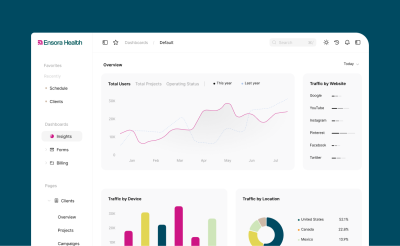12 topics for addiction group therapy sessions

Group therapy is a common component in most modern treatments for addiction. It brings people with everyday shared experiences together to share and learn from each other. Addiction can be isolating. Going through treatment and recovery can feel lonely.
Group therapy is a great way to create a community for your clients who might need it, giving them a safe place to move through their experiences. Keep reading if you are a provider looking for topics to cover during addiction group therapy sessions.
Addiction group therapy topics
Triggers/Temptations
A trigger is something that makes someone more likely to relapse. For someone with alcohol addiction, a trigger might be a party where everyone around them is drinking. For someone with substance addiction, this might mean hanging around people they used with in the past. Strong emotional experiences and trauma can also be triggers for those battling addiction. It is vital to highlight one’s triggers so that they know what situations and experiences might put them at risk for relapsing.
In the group therapy setting, hearing others talk about their triggers can help an individual better understand their own. Therapists can create a space to discuss triggers as well as healthy ways to respond to them.
Self-care
Patients/clients battling addiction rarely leave time to care for themselves. This condition is, by nature, self-destructive. Introducing self-care into their routine is an integral part of their recovery. Providers can talk to their group about different ways they might care for and maintain their mental and physical health.
For example, setting a consistent routine is how some individuals reach their goals—for others, finding a new hobby, surrounding themselves with things that bring them joy, or even exercise might be what works. Self-care for one individual might look very different than it does for another. Group therapy helps generate self-care ideas and holds people accountable to their plans.
Planning
Creating plans for the future is a common way to help clients with addiction stay motivated with their recovery and sobriety. These plans do not have to be grandiose or complicated, but they still give a patient something to look forward to and work toward accomplishing. Discussing this in a group setting helps increase accountability to both their peers and their provider.
Relationships
Healthy relationships with other people are essential for anyone, not just those battling addiction. In addiction recovery, establishing healthy relationships is vital for several reasons. Surrounding oneself with those who bring out the best in them is a great thing to do when maintaining sobriety.
Group therapy is an excellent place for therapists to discuss the characteristics of healthy relationships and how to identify signs of an unhealthy relationship.
Self-forgiveness
Many people with addictions struggle with negative feelings toward themselves. The journey of self-forgiveness is important during someone’s recovery. It allows them to stop viewing themselves negatively, which can perpetuate bad habits, and start viewing themselves as someone worthy of a good life. Providers can discuss what self-forgiveness looks like and why it is so important.
Mindfulness
Mindfulness helps people connect with themselves, relax, reduce stress and better manage anxiety. It is an excellent resource for recovery, assisting individuals in finding peace during such a stressful time. Mindfulness is a great addiction group therapy topic. Providers can discuss how to practice it, giving examples and completing exercises with group members.
Boundaries
Boundaries can be a fuzzy thing to navigate amid recovery with yourself or with others. While challenging, boundaries are critical. They help someone set healthy limits with themselves and others, help someone practice self-care, protect an individual emotionally and physically, and so much more. Therapists can discuss how to establish healthy boundaries during recovery.
Gratitude
Gratitude is the process of expressing how grateful one is to something or someone. Practicing gratitude can help someone gain perspective on what they have versus what they feel they have lost due to their addiction. In group therapy, providers can have their participants discuss different things they are grateful for and why as well as have them practice gratitude outside of sessions.
Coping strategies
Discussing and developing coping strategies is essential for individuals in recovery. This topic can cover various techniques to manage stress, cravings, and emotional pain without resorting to substances. Group members can share their effective coping mechanisms, such as journaling, art therapy, or engaging in physical activities, and explore new strategies together. This collaborative approach fosters empowerment and equips participants with tools to handle challenges.
Relapse prevention
A proactive discussion about relapse prevention can help individuals prepare for potential challenges they may face during their recovery journey. This topic can involve creating personalized relapse prevention plans, identifying warning signs of a potential relapse, and discussing strategies for managing high-risk situations.
Group participants can share their experiences and learn from each other’s insights, fostering a sense of collective resilience. They can also discuss how to navigate high risk situations such as social gatherings or holidays.
Identity and self-discovery
Addiction often impacts a person’s sense of self and identity. This topic can involve exploring how addiction has shaped their identity and encouraging group members to rediscover who they are beyond their addiction. Discussions can include values, interests, and aspirations that contribute to a positive self-concept. Activities like vision boards or personal narratives can encourage self-reflection and help individuals reconnect with their authentic selves.
Goals and motivations
Setting and achieving goals is vital for maintaining motivation and focus in recovery. This topic can facilitate discussions about short-term and long-term goals, both personal and recovery-related. Group members can share their aspirations, celebrate each other’s progress, and provide support and accountability. This collaborative environment encourages individuals to stay committed to their recovery journey while building a sense of community.
The list doesn’t end here. Group therapy is a powerful tool providers can use to help clients battling addiction find community, escape loneliness, and learn valuable skills for recovery. That’s why Ensora Health offers an easy-to-use scheduling tool that includes group sessions. Our software also can even allow you to set up group telehealth sessions to maintain that sense of community even when life or distance gets in the way.






